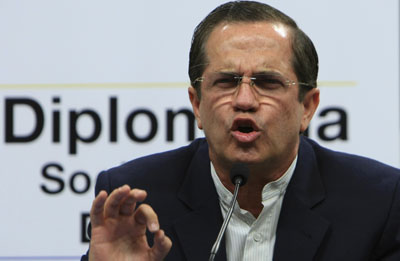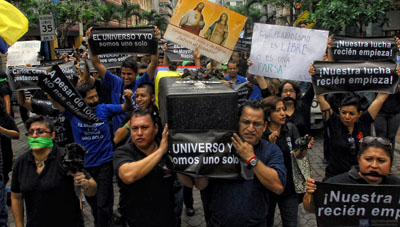Photographer gunned down in Ecuador
Bogotá, Colombia, July 3, 2012–Ecuadoran photographer Byron Baldeón was shot dead Sunday in front of his home in El Triunfo, about 60 kilometers (100 miles) north of the city of Guayaquil. The photographer had become a witness in a criminal case involving alleged police corruption, according to news reports.
Brazil restates commitment to press freedom, UN plan
CPJ has received an encouraging letter from Ambassador Maria Luiza Ribeiro Viotti, Brazil’s permanent representative to the United Nations, affirming the country’s support for the UNESCO-led U.N. Plan of Action for Security of Journalists and the Issue of Impunity.
Free expression in Americas goes beyond left or right
On Sunday the general assembly of the Organization of American States will convene in Bolivia in the verdant, highland valley city of Cochabamba. The 35 member states (every nation in the region except Cuba) are expected to vote on a measure that, if passed, could curtail free expression and press throughout the hemisphere and put…

Nations urge Ecuador to guarantee freedom of expression
Stressing concerns of human rights groups about the deterioration of press conditions under the administration of President Rafael Correa, 17 members of the United Nations submitted recommendations to Ecuador on freedom of expression issues before the U.N. Human Rights Council this week. While Ecuador tried to pass off the criticism as resulting from ignorance, the…
Ecuador should scrap new media bill, draft new one
Dear Mr. Cordero: The Committee to Protect Journalists is deeply concerned about a new Ecuadoran communications bill currently under debate in the National Assembly that would roll back press freedom by promoting self-censorship and restrictions on criticism of public officials.

Despite pardon, Correa does lasting damage to press
New York, February 27, 2012–Ecuadoran President Rafael Correa announced today that he would pardon several news managers and journalists he had sued for libel, but his actions in the cases have done grave damage to free expression in his country, the Committee to Protect Journalists said today. Correa had won separate libel complaints against executives of…
Attacks on the Press in 2011: State Media As Anti-Media Tool
In some Latin American countries, state-owned media are used not only for propaganda but as platforms to smear critics, including journalists. Some elected leaders have even invested in large multimedia holdings to further their agendas. By Carlos Lauría
Attacks on the Press in 2011: Ecuador
The press freedom climate continued its sharp decline under President Rafael Correa. In September, a CPJ special report concluded that Correa’s policies had transformed the country into one of the hemisphere’s most restrictive nations for the press. In March, Correa brought a criminal libel complaint against senior managers of El Universo, the country’s leading critical…

In Ecuador, a crushed and silenced democracy
The sentence against Ecuadoran newspaper El Universo, its opinion editor, Emilio Palacio Urrutia, and its three top executives, Carlos Eduardo Pérez Barriga, César Enrique Pérez Barriga, and Carlos Nicolás Pérez Lapentti, for supposed offenses against Ecuadoran President Rafael Correa in Palacio’s article “NO to lies,” is a worn-out manifestation of the perverse concept of public…